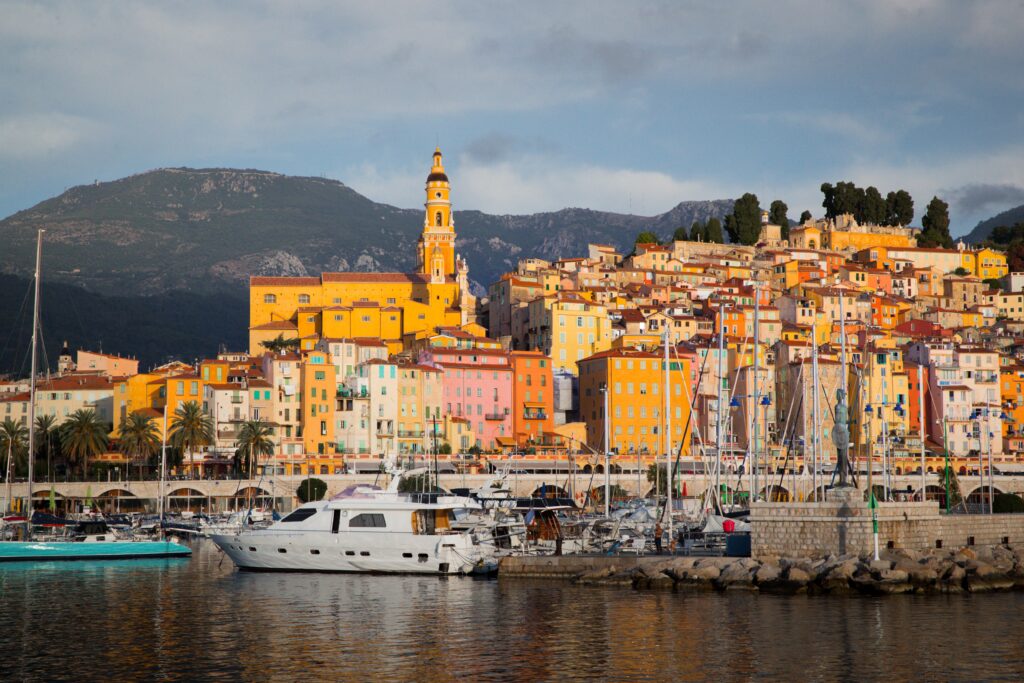VISIT PORTUGAL
The oldest country in Europe – having kept the same defined borders since 1139 – hides a wonderful selection of colourful cities, beautiful beaches, and idyllic islands.
Currency
€ - Euro (1€ ≃ 1,05$ ≃0,86£)
POPULATION
10 millions
MAIN LANGUAGES
Portuguese
AREA
92,212 km²
TIME ZONE
UTC+1 (UTC-1 in the Azores)
FLAG
🇵🇹
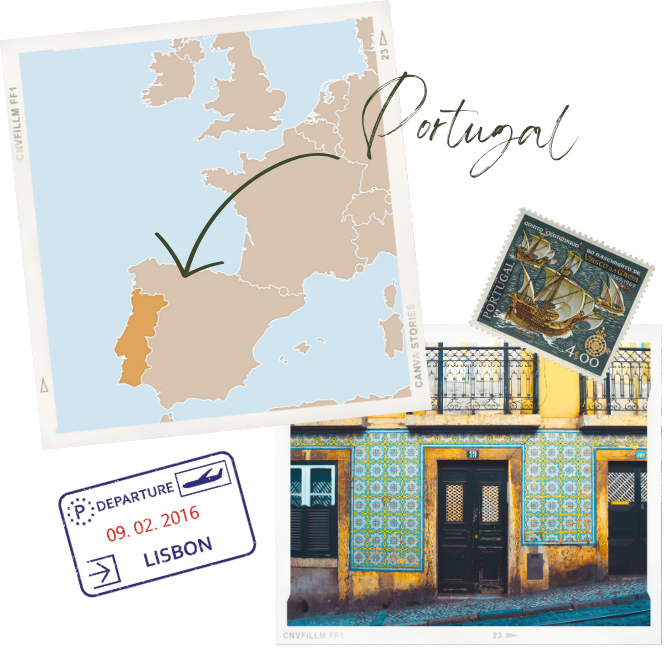

TAKE A DAY TRIP TO SINTRA
A charming Portuguese town located only 30 min away from Lisbon, home to a majestic pine forest and the colourful Palacio da Pena.

KAYAK TO BENAGIL CAVE
Unquestionably one of Portugal's most beautiful and well-known natural landmarks is Benagil Cave, which is in the Algarve region.

HIKE ON PORTUGUESE ISLANDS
Azores and Madeira are two Portuguese archipelagos set in the Atlantic Ocean, both renowned for their tranquillity and outstanding nature.

CHECK THE AZULEJOS IN PORTO
The traditional blue ceramic tiles are characteristic of the Portuguese landscape and can be seen all over Porto, a major city also known for its wine port.

EXPLORE LISBON
The Portuguese capital is gorgeous and considered to be the coolest in Europe by many. Fall in love with its balance of historical heritage and striking modernity.
Pick a Portuguese destination

Lisbon
Charismatic capital city, known for its colourful buildings and impressive miradouros.

Algarve
Beaches to suit all tastes, from sandy beaches to small bays nestled between rock.

Azores
Archipelago of 9 volcanic islands home to dramatic landscapes.
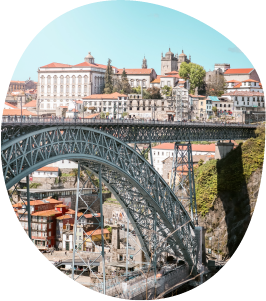
Porto
World-famous for its port wine and Portugal's second-largest city.

Madeira
A green oasis on the Atlantic Ocean offering a permanent spring-like climate.
Prepare your trip to Portugal
💡 Why visit Portugal?
Portugal offers a perfect mix of history, natural beauty, and vibrant culture. From the cobbled streets of Lisbon and the colorful tiles of Porto to the golden beaches of the Algarve and the vineyards of the Douro Valley, the country captivates with its laid-back charm and diversity. Portugal is also one of Europe’s best-value destinations, making it ideal for both city breaks and outdoor adventures.
🪪 Do I need a visa to visit Portugal?
Portugal is part of the Schengen area. Citizens of the EU, USA, Canada, Australia, and many other countries can enter visa-free for up to 90 days within a 180-day period. However, some nationalities do require a visa. It’s best to check with the nearest Portuguese embassy or consulate for the most up-to-date information specific to your situation.
IMPORTANT NOTE: The information below is provided merely as an indication and applies for short-term tourism visa purposes only. Before your trip to Portugal, or if you are planning to come to Portugal for another purpose (work, studies, …), check the official information on the European Commission website’s page about Schengen visa application: https://www.home-affairs.ec.europa.eu/
⏳ Visa-free but limited to maximum 90 days for a period of 180 days if you are a citizen of one of the following countries: Albania; Andorra; Antigua and Barbuda; Argentina; Australia; Austria; Bahamas; Barbados; Belgium; Bosnia and Herzegovina; Brazil; Brunei; Bulgaria; Canada; Chile; Colombia; Costa Rica; Croatia; Czechia; Denmark; Dominica; El Salvador; Estonia; Finland; France; Georgia; Germany; Greece; Grenada; Guatemala; Honduras; Hong Kong; Hungary; Iceland; Israel; Italy; Japan; Kiribati; Kosovo; Latvia; Liechtenstein; Lithuania; Luxembourg; Macau; Malaysia; Malta; Marshall Islands; Mauritius; Mexico; Micronesia; Moldova; Monaco; Montenegro; Netherlands; New-Zealand; Nicaragua; North Macedonia; Norway; Palau; Panama; Paraguay; Peru; Poland; Portugal; Romania; Saint Kitts and Nevis; Saint Lucia; Saint Vincent and the Grenadines; Samoa; San Marino; Serbia; Seychelles; Singapore; Slovakia; Slovenia; Solomon islands; South Korea; Spain; Sweden; Switzerland; Taiwan; Timor-Leste; Tonga; Trinidad and Tobago; Tuvalu; Ukraine; United Arab Emirates; United Kingdom; United States of America; Uruguay; Vatican; Venezuela
🛂 Visa required if you are a citizen of one of the following countries: Afghanistan; Algeria; Angola; Armenia; Azerbaijan; Bahrain; Bangladesh; Belarus; Belize; Benin; Bhutan; Bolivia; Botswana; Burkina Faso; Burundi; Cambodia; Cameroon; Cape Verde; Central African Republic; Chad; China; Comoros; Congo; Congo (Dem. Rep); Cote d’Ivoire (Ivory Coast); Cuba; Djibouti; Dominican Republic; Ecuador; Egypt; Equatorial Guinea; Eritrea; Eswatini; Ethiopia; Fiji; Gabon; Gambia; Ghana; Guinea; Guinea-Bissau; Guyana; Haiti; India; Indonesia; Iran; Iraq; Jamaica; Jordan; Kazakhstan; Kenya; Kuwait; Kyrgyzstan; Laos; Lebanon; Lesotho; Liberia; Libya; Madagascar; Malawi; Maldives; Mali; Mauritania; Mongolia; Morocco; Mozambique; Myanmar; Namibia; Nauru; Nepal; Niger; Nigeria; North Korea; Oman; Pakistan; Palestine; Papua New Guinea; Philippines; Qatar; Russia; Rwanda; Sao Tome and Principe; Saudi Arabia; Senegal; Sierra Leone; Somalia; South Africa; South Sudan; Sri Lanka; Sudan; Suriname; Syria; Tajikistan; Tanzania; Thailand; Togo; Tunisia; Turkey; Turkmenistan; Uganda; Uzbekistan; Vanuatu; Vietnam; Yemen; Zambia; Zimbabwe
⛅ When is the best time to visit Portugal?
❄️ December – February: Winter is mild in much of Portugal, especially in the south. Lisbon averages 8°C (46°F) to 15°C (59°F), and the Algarve stays even warmer. While not beach season, it’s a peaceful time to visit cities and enjoy lower prices.
🌱 March – May: Spring is one of the best times to visit, with blooming flowers, fewer crowds, and pleasant temperatures across the country. It’s great for hiking, sightseeing, and road trips.
☀️ June – August: Summer is hot and dry, especially in the interior and southern regions. Coastal cities like Porto and Lisbon remain cooler. This is peak season, particularly in beach destinations, so book early.
🍂 September – November: Autumn is warm and less crowded. September is especially good for beachgoers, while October and November are perfect for cultural visits and wine tastings in regions like Alentejo and the Douro Valley.
🚉 How to get around Portugal?
Portugal has a good mix of public transport and scenic road trip options:
🚌 Buses: Long-distance and regional buses are reliable and affordable. Rede Expressos and FlixBus cover major cities and towns.
🚂 Trains: Portugal’s train network is efficient, with comfortable Alfa Pendular high-speed trains linking Lisbon, Porto, and the Algarve. Regional trains are slower but scenic.
🚗 Car Rental: Renting a car is ideal for exploring rural areas and national parks. Roads are in good condition, and toll highways are efficient. An International Driving Permit (IDP) is not required if your license is in Latin script.
💳 Can I use bank cards or cash for payments in Portugal?
Cards are widely accepted, especially Visa and Mastercard. Smaller shops and rural areas may prefer cash, so it’s helpful to carry some euros. American Express is accepted in fewer places.
🔌 What type of plugs and voltage does Portugal use?
Portugal uses plug types C and F, both with two round pins. The standard voltage is 230V and the frequency is 50Hz.
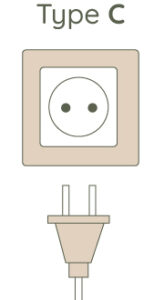
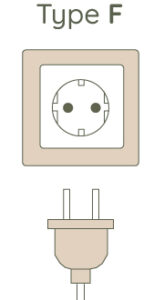
If needed, you can order an universal travel plug adapter here.
🪙 Is tipping customary in Portugal?
Tipping is not obligatory, but appreciated. In restaurants, locals often round up the bill or leave 5-10% for good service. Tipping in cafés, taxis, or for hotel staff is also common but not expected.
🥛 Is it safe to drink tap water in Portugal?
Tap water is safe to drink throughout Portugal.
📅 When are public holidays and store closing days in Portugal?
In Portugal, stores often close on Sundays. There are 10 national public holidays in Portugal:
- New Year’s Day (January 01)
- Freedom Day (April 25)
- Labour Day (May 01)
- Portugal Day (June 10)
- Assumption Day (August 15)
- Republic Day (October 05)
- All Saints’ Day (November 01)
- Restoration of Independence (December 01)
- Immaculate Conception (December 08)
- Christmas Day (December 25)
On these days, most businesses and offices will be closed, and many attractions may be shut or have limited opening hours.
🚦 What are the speed limits in Portugal?
In Portugal, traffic drives on the right-hand side of the road. The main speed limits are as follows:
- 50 kph / 30 mph in urban areas
- 90 kph / 56 mph on secondary roads
- 100 kph / 62 mph on main roads
- 120 kph / 75 mph on motorways
During adverse weather (rain, fog, etc.), the speed limits are lowered.
💬 What are some basic Portuguese words I should know?
- Hello (informal) = Olá
- Good day = Bom dia
- Goodbye = Adeus
- Yes = Sim
- No = Não
- Thank you = Obrigado (if you’re male) / Obrigada (if you’re female)
- Please = Por favor
- You’re welcome = De nada
- Excuse me = Desculpe
- Day = Dia
- Night = Noite
- Good evening = Boa tarde
- Goodnight = Boa noite
- Mister = Senhor
- Ma’am = Senhora
- Street = Rua
- Road = Estrada
💡 Tip: With the GoogleTranslate app, you can download the Portuguese language to use it even offline!
🛡️ Is it safe to travel in Portugal?
Portugal is one of the safest countries in Europe. Crime rates are low, and locals are friendly and helpful. Still, use basic travel precautions:
Secure Your Belongings: Pickpocketing can occur in touristy areas, especially in Lisbon, Porto, and on public transport.
Emergency Numbers: Dial 112 for police, fire, or medical emergencies anywhere in Portugal.


